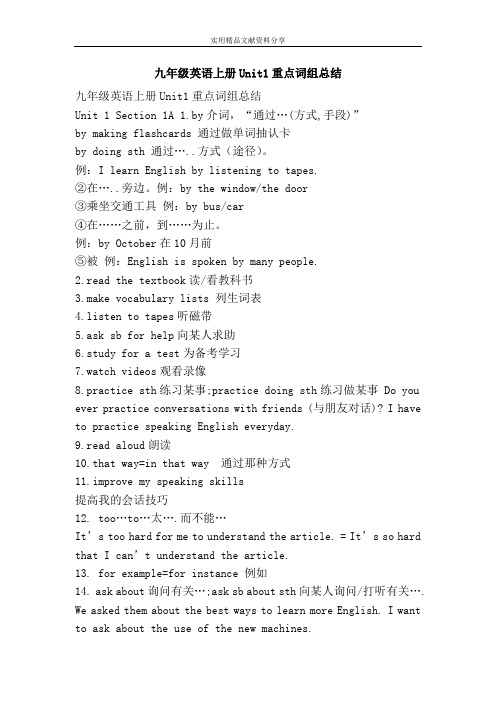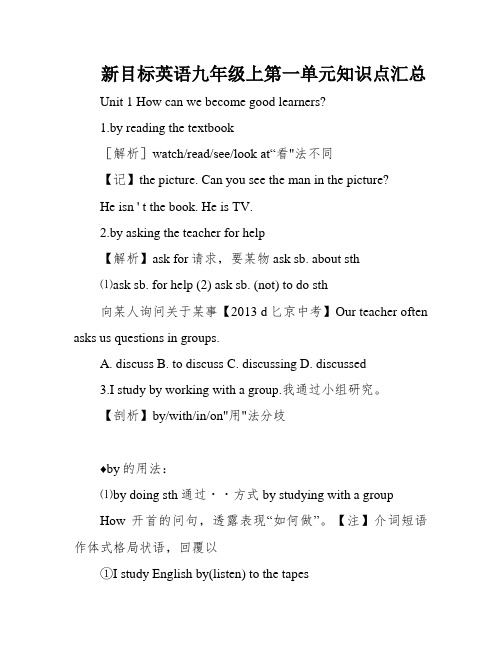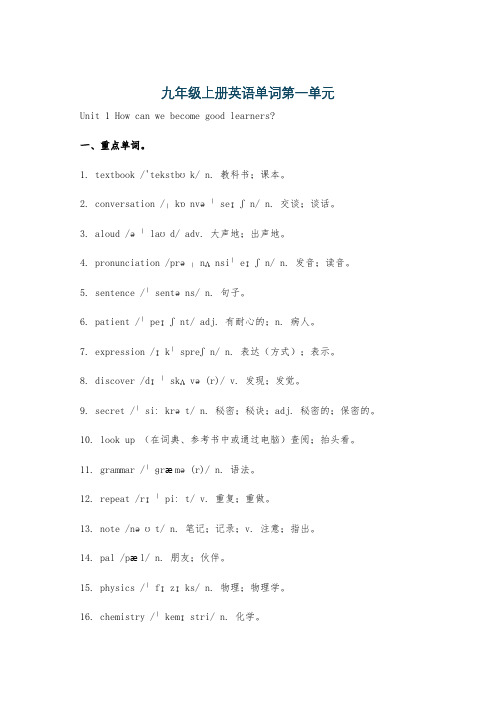九年级上册英语第一单元知识点
九年级英语上册第一单元笔记

九年级英语上册第一单元笔记一、重点单词。
1. textbook.- 词性:名词,意为“教科书;课本”。
例如:We need to buy a new English textbook.(我们需要买一本新的英语课本。
)2. conversation.- 词性:名词,“交谈;谈话”。
短语“have a conversation with sb.”表示“与某人交谈”,如:I had a great conversation with my teacher yesterday.(我昨天和我的老师进行了一次很棒的交谈。
)3. aloud.- 词性:副词,“大声地;出声地”。
区别于“loud”(形容词,可作副词,侧重声音响亮)和“loudly”(副词,侧重喧闹地)。
例如:Read the text aloud.(大声朗读课文。
)4. pronunciation.- 词性:名词,“发音;读音”。
例如:His pronunciation is very good.(他的发音很好。
)5. sentence.- 词性:名词,“句子”。
例如:Make a sentence with this word.(用这个词造一个句子。
)6. patient.- 词性:- 形容词,“有耐心的”,be patient with sb.表示“对某人有耐心”,如:Our teacher is patient with us.(我们的老师对我们很有耐心。
)- 名词,“病人”,例如:The doctor has many patients every day.(这位医生每天有很多病人。
)7. expression.- 词性:名词,“表达(方式);表示;表情”。
例如:His facial expression shows that he is happy.(他的面部表情表明他很开心。
)8. discover.- 词性:动词,“发现;发觉”。
九年级英语上册Unit1重点词组总结

九年级英语上册Unit1重点词组总结九年级英语上册Unit1重点词组总结Unit 1 Section 1A 1.by介词,“通过…(方式,手段)”by making flashcards 通过做单词抽认卡by doing sth 通过…..方式(途径)。
例:I learn English by listening to tapes.②在…..旁边。
例:by the window/the door③乘坐交通工具例:by bus/car④在……之前,到……为止。
例:by October在10月前⑤被例:English is spoken by many people.2.read the textbook读/看教科书3.make vocabulary lists 列生词表4.listen to tapes听磁带5.ask sb for help向某人求助6.study for a test为备考学习7.watch videos观看录像8.practice sth练习某事;practice doing sth练习做某事 Do you ever practice conversations with friends (与朋友对话)? I have to practice speaking English everyday.9.read aloud朗读10.that way=in that way 通过那种方式11.improve my speaking skills提高我的会话技巧12. too…to…太….而不能…It’s too hard for me to understand the article. = It’s so hard that I can’t understand the article.13. for example=for instance 例如14. ask about询问有关…;ask sb about sth向某人询问/打听有关…. We asked them about the best ways to learn more English. I want to ask about the use of the new machines.15. watch/see/hear sb do sth观看/看见/听见某人做过某事;watch/see/hear sb doing sth观看/看见/听见某人正在做某事He can watch actors say the words. Can you hear him singing in the room?16. 辨析:sometime ;sometimes ;some times ;some time ①sometime 在将来/过去的某一时间I’ll speak to him about it sometime. 我会找个时间和他谈谈这事. I met her sometime last year.去年的某个时候我见过她. ② sometimes = at times有时,偶尔It is sometimes hot and sometimes cold here. He sometimes writes to me. ③some time A.一些时间:It will take you some time to walk there. B.在未来的某时=sometime: Phone me some time next week 下个星期什么时候给我打电话吧. ④s ome times一些次,几次 I've told him the thing some times.17. join短语:①join sb加入到某人的活动中去②join in+活动项目"参加…活动" I'd like to join in the game. ③join+组织机构"加入到某个组织机构,成为其中的一个成员"join the Party; join the League, The best way to improve your English is to join an English club18. have fun 玩得高兴19. not at all 一点也不20. get excited 高兴、激动21. end up (vi.) 结束; 告终; 结果 ; 最后end up doing sth.We end up taking a taxi there .我们结果乘出租车去了那里. We sometimes end up speaking in Chinese.(以说汉语结束对话)22. do a survey 做调查;do a survey about针对…做调查 I'm doinga survey about learning English. 我在进行学习英语的调查。
九年级英语上册重要知识点总结

九年级英语上册重要知识点总结Document serial number【NL89WT-NY98YT-NC8CB-NNUUT-NUT108】九年级英语上册第一单元重要知识点总结九年级英语上册第一单元重要知识点总结Unit1一、知识点:在旅馆的登记入住。
ut:在旅馆结账离开。
2.By:①通过…..方式(途径)。
例:IlearnEnglishbylisteningtotapes.②在…..旁边。
例:bythewindow/thedoor③乘坐交通工具例:bybus/car④在……之前,到……为止。
例:byOctober在10月前⑤被例:Englbymanypeople.3.how与what的区别:how通常对方式或程度提问,意思有:怎么样如何,通常用来做状语、表语。
what通常对动作的发出者或接受者提问,意思为什么,通常做宾语,主语。
①Howisyoursummerholiday?It’sOK.(how表示程度做表语)②Howdi dyoutravelaroundtheworld?Itravelbyair.③Whatdoyoulearnatschool?IlearnEnglish,mathandma ubjects.①What……?How…like…?②What…dowith…?How…dealwith…?③What…likeabout…?How…like…?④What’stheweatherliketoday?How’stheweathertod ay?⑤Whattodo?Howtodoit?e.g.Whatdoyoubook?=Howdoyoulbook?Idon’tknowwhatIshoulddowatter.=Idon’tknowhowIs houlddealwWhatdoyoulikeaboutChina?=Howdoyoula?Idon’tknowwhattodonextstep?=Idon’tknowhowtodoi tnextstep?㊣Whatgood/badweaday!(weather为不可数名词,其前不能加a)㊣Whatafine/baddaday!(day为可数名词,其前要加a)4.aloud,loud与loudly的用法:三个词都与"大声"或"响亮"有关。
九年级英语上册各单元知识点归纳

九年级英语上册各单元知识点归纳第一单元:基础知识1. 介词短语的使用:介词短语是由一个介词和它的宾语组成的短语,用来表示时间、地点、方向、原因等。
例如:"on the table"(在桌子上),"in the park"(在公园里)。
介词短语在句子中作状语、定语、宾语等。
需要注意介词与宾语之间的搭配。
2. 动词的时态和语态:英语中的动词有多种时态和语态。
常见的时态有一般现在时、一般过去时、一般将来时等。
常见的语态有主动语态和被动语态。
时态用于表示动作发生的时间,语态用于表示动作的执行者。
例如:"She is reading a book."(她正在读一本书)。
需要注意时态和语态的用法和变化规则。
3. 名词的单复数形式:英语中的名词有单数和复数形式。
复数形式一般是在名词后面加-s或-es。
有些名词的复数形式较特殊,需要记忆。
例如:"a cat"(一只猫)的复数形式是"cats"(多只猫)。
需要注意名词的单复数形式在句子中的搭配和用法。
第二单元:阅读理解1. 完型填空:完型填空是一种考察学生对语境理解和词汇运用能力的题型。
在完型填空中,通常给出一篇文章和一些空格,要求学生根据文章内容和语境选择正确的单词或短语填入空格中。
通常需要结合文章整体逻辑和上下文意义来填写正确答案。
2. 阅读理解题:阅读理解题是一种考察学生阅读理解能力和推理能力的题型。
通常会给出一篇短文或文章,然后根据文章内容提出一些问题,要求学生根据文章内容和推理来回答问题。
需要学会熟练阅读和理解文章,抓住关键信息和主题,并能运用推理等能力来回答问题。
第三单元:语法知识1. 直接引语和间接引语:在英语中,当我们引述别人的话时,可以使用直接引语和间接引语。
直接引语是直接引用别人所说的话,使用引号将其包围;间接引语是将别人所说的话转述出来。
例如:直接引语:"I am happy," she said.(她说:“我很开心。
(完整版)九年级英语上册第一单元知识点总结

九年级英语上册第一单元知识点总结九年级英语上册第一单元知识点总结Unit 1一、知识点: 在旅馆的登记入住。
ut: 在旅馆结账离开。
2.By: ①通过…..方式(途径)。
例:I learn English by listening to tapes.②在…..旁边。
例:by the window/the door③乘坐交通工具例:by bus/car④在……之前,到……为止。
例:by October在10月前⑤被例:Englby many people.3.how与what的区别:how通常对方式或程度提问,意思有:怎么样如何,通常用来做状语、表语。
what通常对动作的发出者或接受者提问,意思为什么,通常做宾语,主语。
①How is your summer holiday? It’s OK.(how表示程度做表语)②How did you travel around the world? I travel by air.③What do you learn at school? I learn English, math and maubjects.① What……? How…like…?② What…do with…? How…deal with…?③ What…like about…? How…like…?④ What’s the weather like today? How’s the weather today?⑤ What to do? How to do it?e.g. What do youbook?=How do you lbook?I don’t know what I should do watter.=I don’t know how I should deal wWhat do you like about China?=How do you la?I don’t know what to do next step?=I don’t know how to do it next step?㊣ What good / bad weaday!(weather为不可数名词,其前不能加 a )㊣ What a fine / bad daday! (day为可数名词,其前要加 a )4. aloud, loud与loudly的用法 : 三个词都与"大声"或"响亮"有关。
新目标英语九年级上第一单元知识点汇总

新目标英语九年级上第一单元知识点汇总Unit 1 How can we become good learners?1.by reading the textbook[解析]watch/read/see/look at“看"法不同【记】the picture. Can you see the man in the picture?He isn ' t the book. He is TV.2.by asking the teacher for help【解析】ask for请求,要某物ask sb. about sth⑴ask sb. for help (2) ask sb. (not) to do sth向某人询问关于某事【2013 d匕京中考】Our teacher often asks us questions in groups.A. discussB. to discussC. discussingD. discussed3.I study by working with a group.我通过小组研究。
【剖析】by/with/in/on"用"法分歧♦by的用法:⑴by doing sth通过・・方式by studying with a groupHow开首的问句,透露表现“如何做”。
【注】介词短语作体式格局状语,回覆以①I study English by(listen) to the tapes②Tom learns Chinese by(watch) Chinese movies.③--did you get there?- By a taxi.A. How; takingB. How ; takeC. How; tookD. What; taking(2) by+交通工具(交通工具前不能加限定词)♦with的用法:表示用某种工具⑴with +工具We like to write with a pen.(2)with+eyes.♦in的用法:平日与“穿着、声音、誊写资料”等称号连用in+语言in English用英语speak in a soft voice♦on的用法:on +电器或序言on TV /radio/Internet()The boy was cutting a branch of a tree a knife.A. inB. byC. withD. use4.Do you learn English by watching videos?by bike by train人体部位We see with our【解析】learn—learned/learnt—learned/learnt v研究learn about相识(1)learn from sb.(2)learn to do sth向某人研究学着做某事(3)learn…by oneself= teach oneself自学⑴aloud adv“出声",指出声能让人听见,但声音不大read aloud大声朗读(2) loud adj./adv作副词时,常与speak, talk, laugh等连用。
九年级上册英语单词第一单元

九年级上册英语单词第一单元Unit 1 How can we become good learners?一、重点单词。
1. textbook /'tekstbʊk/ n. 教科书;课本。
2. conversation /ˌkɒnvəˈseɪʃn/ n. 交谈;谈话。
3. aloud /əˈlaʊd/ adv. 大声地;出声地。
4. pronunciation /prəˌnʌnsiˈeɪʃn/ n. 发音;读音。
5. sentence /ˈsentəns/ n. 句子。
6. patient /ˈpeɪʃnt/ adj. 有耐心的;n. 病人。
7. expression /ɪkˈspreʃn/ n. 表达(方式);表示。
8. discover /dɪˈskʌvə(r)/ v. 发现;发觉。
9. secret /ˈsiːkrət/ n. 秘密;秘诀;adj. 秘密的;保密的。
10. look up (在词典、参考书中或通过电脑)查阅;抬头看。
11. grammar /ˈɡræmə(r)/ n. 语法。
12. repeat /rɪˈpiːt/ v. 重复;重做。
13. note /nəʊt/ n. 笔记;记录;v. 注意;指出。
14. pal /pæl/ n. 朋友;伙伴。
15. physics /ˈfɪzɪks/ n. 物理;物理学。
16. chemistry /ˈkemɪstri/ n. 化学。
17. memorize /ˈmeməraɪz/ v. 记忆;记住。
18. pattern /ˈpætn/ n. 模式;方式。
19. increase /ɪnˈkriːs/ v. 增加;增长。
20. speed /spiːd/ n. 速度;v. 加速。
21. partner /ˈpɑːtnə(r)/ n. 搭档;同伴。
22. born /bɔːn/ v. (bear的过去分词)出生;adj. 天生的。
英语九年级上册一二单元知识点

英语九年级上册一二单元知识点Unit 1: Personal Information1. Greetings and IntroductionsIn English, greetings and introductions play an essential role in establishing social connections and showing respect. When meeting someone for the first time, it is common to use phrases like "Hello" or "Hi" to greet them. Additionally, you can ask "How are you?" as a way to inquire about their well-being. Responding with phrases such as "I'm fine, thank you" or "I'm doing well" is considered polite.When introducing oneself, it is customary to start by saying, "My name is [your name]." Including additional information after your name is optional, but it can help initiate conversation. For example, you may mention your nationality, occupation, or interests. Remember to maintain eye contact and offer a friendly smile during introductions.2. Personal PronounsPersonal pronouns are essential for effective communication in English. They are used to refer to oneself and others. Here are the commonly used personal pronouns:- Subject pronouns: I, you, he, she, it, we, they- Object pronouns: me, you, him, her, it, us, them- Possessive adjectives: my, your, his, her, its, our, their- Possessive pronouns: mine, yours, his, hers, its, ours, theirs- Reflexive pronouns: myself, yourself, himself, herself, itself, ourselves, yourselves, themselvesUnderstanding and using personal pronouns correctly is crucial for effective communication and avoiding misunderstandings in conversations.3. Family MembersBeing able to talk about family members is an essential part of daily interactions. Here are some common family members and the corresponding vocabulary:- Parents: mother, father- Siblings: brother, sister- Grandparents: grandmother, grandfather- Aunt/Uncle: aunt, uncle- Cousins: cousin (male or female)- Nephew/Niece: nephew, nieceRemember to use possessive adjectives to indicate relationships. For example, "my mother," "his sister," or "our grandparents."4. Hobbies and InterestsTalking about hobbies and interests is a great way to engage in conversations and get to know others better. Here are some examples of hobbies and interests often discussed in English:- Sports: football, basketball, swimming, etc.- Music: playing an instrument, singing, dancing, etc.- Reading: novels, newspapers, magazines, etc.- Travel: exploring new places, experiencing different cultures, etc.- Cooking: trying out new recipes, baking, etc.When discussing hobbies, it's common to use phrases like "I enjoy..." or "I like to..." to express personal preferences.Unit 2: School1. School SubjectsIn English, there are various school subjects that students study. Here are some common subjects and their corresponding vocabulary:- Mathematics- Science (Physics, Chemistry, Biology)- History- Geography- English- Physical Education (PE)- Art- MusicWhen discussing school subjects, it's important to use appropriate verbs such as "study," "learn," or "take." For example, "I study mathematics" or "We are learning English."2. Classroom ObjectsBeing familiar with the vocabulary related to classroom objects is essential for effective communication within a school setting. Here are some examples:- Desk- Chair- Whiteboard- Blackboard- Textbook- Pen/pencil- Notebook- Ruler- EraserUnderstanding and using these words will allow students to engage in classroom discussions and accurately describe their environment.3. Time ExpressionsTime expressions are crucial when discussing schedules and organizing activities. Here are some commonly used time expressions:- Daily: today, tomorrow, yesterday- Weekly: Monday, Tuesday, Wednesday, etc.- Monthly: January, February, March, etc.- Seasons: spring, summer, autumn, winter- Adverbs of frequency: always, often, sometimes, rarelyUsing the appropriate time expressions enables effective communication and helps in planning and scheduling activities.ConclusionThe knowledge points covered in Units 1 and 2 of the English textbook for ninth graders provide a solid foundation for students' language development. Mastering greetings, introductions, personal pronouns, family vocabulary, school subjects, classroom objects, time expressions, and hobbies will greatly enhance students' ability to express themselves in English confidently. Practice and consistent usage of these language skills will contribute to overall language proficiency and communication fluency.。
- 1、下载文档前请自行甄别文档内容的完整性,平台不提供额外的编辑、内容补充、找答案等附加服务。
- 2、"仅部分预览"的文档,不可在线预览部分如存在完整性等问题,可反馈申请退款(可完整预览的文档不适用该条件!)。
- 3、如文档侵犯您的权益,请联系客服反馈,我们会尽快为您处理(人工客服工作时间:9:00-18:30)。
九年级上册英语第一单元知识点【篇一】九年级上册英语第一单元知识点I.重点词汇Test----exam words----vocabulary Excited----exciting amazing----surprising sometimes----sometime----some times----some time for example----such as----like begin with----to begin with maybe----perhaps----probably affect----influence problem----question II.重点词组 1.ask…for…2.speaking skills3.ask…about…4.not…at all5.get excited about6.end up7.make mistakes8.first of all9.to begin with ter on 11.be afraid of ugh at 13.make sentences 14.take notes 15.write down 16.make sure 17.deal with 18.look up 19.make up 20.worry about 21.be angry with 22.go by 23.each other 24.solve a problem 25.regard…as… plain about 27.change…into… 28.try one’s best 29.with the help of pare…to… 31.think about 32.break off III.重点句子 1.I learn by studying with a group. 2.It’s too hard to understand the voices. 3.He finds watching movies frustrating because the people speak too quickly.4.We get excited about something and then end up speaking in Chinese.5.Why don’t you join an English club to practice English.st year my English classwas difficult for me. 7.It was easy for me to understand the teacher. 8.Now I’m enjoying learning English.9.Perhaps we have seen young children playing together. IV.话题语法 1.谈论学习方法 2.by+v-ing结构做状语【篇二】九年级上册英语第一单元知识点Unit 1 How can we become good learners? 【重点短语】1. good learners 优秀的学习者 2. work with friends 和朋友一起学习 3. study for a test 备考 4.have conversations with 与……交谈 5.speaking skills 口语技巧 6.a little 有点儿 7.at first 起初起先 8.the secret to... .......的秘诀 9.because of 因为 10.as well 也 11.look up 查阅;抬头看 12.so that 以便,为了 13.the meaning of ……的意思 14.make mistakes 犯错误 15.talk to 交谈 16.depend on 依靠依赖 17.in common 共有的18.pay attention to 注意关注19. connect …with …把……联系20.for example 例如21.think about 考虑22.even if 即使尽管纵容23.look for 寻找 24.worry about 担心担忧 25.make word cards 制作单词卡片 26.ask the teacher for help 向老师求助 27.read aloud 大声读 28.spoken English 英语口语 29.give a report 作报告 30.word by word 一字一字地 31. so……that 如此……以至于 32.fall in love with 爱上33.something interesting 有趣的事情34.take notes 记笔记 35.how often 多久一次 36.a lotof 许多37.the ability to do sth. 做某事的能力38.learning habits 学习习惯39.be interested in 对……感兴趣 40.get bored 感到无聊【重点句型】 1.提建议的句子:①What/ how about +doing sth.? 做…怎么样?如:What/ How about going shopping? ②Why don’t you + do sth.? 你为什么不做…?如:Why don’t you go shopping? ③Why not + do sth. ? 为什么不做…?如:Why not go shopping? ④Let’s + do sth. 让我们做…吧。
如:Let’s go shopping ⑤Shall we/ I + do sth.? 我们/我…好吗?如:Shall we/ I go shopping? 2. too…to...... 太…而不能如:I’m too tired to say anything. 我太累了,什么都不想说。
3. be / get excited about sth. 对…感兴奋 4. end up doing sth : 以......结束如:The party ended up singing. 晚会以唱歌而结束。
5. end up with sth. 以…结束如:The party ended up with her singing. 晚会以她的歌唱而告终。
【篇三】九年级上册英语第一单元知识点Unit 1 How can we become good learners? 1. work with groups 小组合作 2. ask sb. for sth. 向某人请求某物ask sb. about sth. 向某人询问关于某事 3. study for a test 备考 4. have conversations with sb. 与某人对话 5. read aloud大声朗读 6.aloud ,loud, loudly的区别 (1) aloud只能做副词,强调“出声”。
作“出声地”解释时,主要与read, think等连用;作“大声地”解释时,主要与call,shout, cry等连用。
(2) loud既可作形容词,意为“大声的;响亮的”;也可作副词,主要指说话声和笑声等,强调发出的声音强度大、传得远,多用来修饰speak, talk, laugh 等动词。
如: (3) loudly是副词,意为“高声地;大声地”,指人声、敲门声或其他各种声音,有“喧闹、嘈杂”之意,与loud用法一样,但使用范围更广,常与ring, knock等动词连用。
7.practice doing sth. 练习做某事8. speaking skills 说的技巧 9.spoken English 英语口语written English 英语书面语 10.finish doing sth. 结束/完成做某事 11. give a report 作报告 12. word by word 逐字逐字的13.patient adj.有耐心的/ n.病人–patience n.耐心 be patient with sb. 对某人有耐心 be patient to do sth. 做某事有耐心 14.The+比较级...,the+比较级...表示“越……,越……” 15.learn to do sth. 学会做某事16. 辨析so that, so...that...与too...to... (1)so that引导目的状语从句,从句中可使用情态动词或助动词,与in order that同义;变为简单句时,可用in order to进行转换。
(2)so...that...表示“如此……以至于……”,引导结果状语从句,从句中一般不用can或may等词,与such...that...同义;表示否定,变为简单句时,可用too...to...进行转换。
(3)too...to...表示“太……而不能……”,其基本结构为“too+形容词或副词+to+动词原形”,可与so/such...that..., be not...enough to do sth. 互换使用。
17. be afraid to do/of doing 害怕做某事18.called =named (被)叫做…19.because of +单词或短语 because +原因状语从句 20. fall in love with 恋上、爱上… 21. body language 肢体语言 22. key words 关键词 23. the secret to …. …的秘密,秘诀 24. a piece of cake 小菜一碟 25. it severs you right 自作自受,活该 26.look up 查找… (动副短语,代入其中) 27. keep a diary 写日记 28. take notes 做笔记 29.increase to …增加到… increase by…增加了…30. make mistakes in …在方面…犯错误 31. be born with 天生具有… 32.the ability to do sth. 做…的天赋/能力 33. depend on 依赖于,取决于 34. learning habits 学习习惯 35.have …in common 在方面有共同之处 36. pay attention to 关注… 37.need用法:主语是人:need to do sth . / 主语是事物:need dong sth. 38. connect…with…把…和…联系起来 39.even if= even though 即使(引导让步状语从句) 40. practice makes perfect 熟能生41. learn from …向/从…学习 learn from mistakes 吸取错误的教训 42. mind maps 思维导图 43. explain…to…把…解释给…. 44. find out 弄清楚,查明白,找出 45. be stressed out 紧张的,不安的 46. worry about担心,担忧 47. on one’s own 独自地,独立地 48.by的用法①by 凭借,通过(介词) do sth by doing sth 提问用How ②by +交通工具= take the +交通工具③by表示时间,意为“到……时(为止);在……以前、不迟于”。
